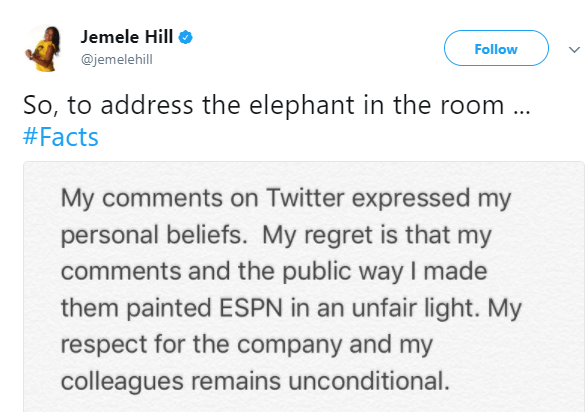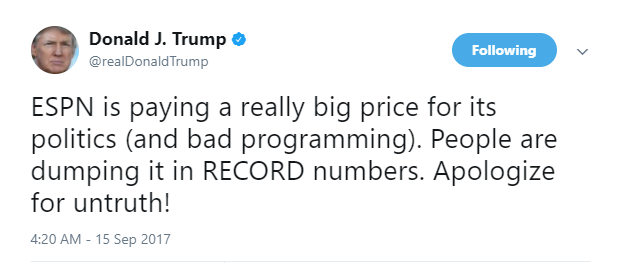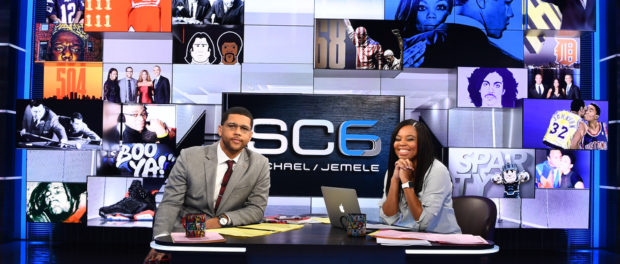I fully intended to avoid writing about this topic because I’ve grown increasingly tired of the whole political-sports media dance. But then a whole new chain of events unfolded, and now here I am, using a line from a Franz Ferdinand song to describe the mess ESPN finds itself in – “This fire is out of control.”
By now you’re probably aware that Jemele Hill of ESPN’s SC6 went off on Twitter about President Donald Trump. If you haven’t seen her tweets, it’s your lucky day. See below.
Hill’s tweets created a stir on social media, leading ESPN to issue a statement. The network said they had talked to Jemele about her actions and she realized they were inappropriate.
But that didn’t satisfy the masses. The pressure increased when White House Press Secretary Sarah Huckabee Sanders was asked about Hill’s comments during a briefing with the press, and said Hill’s remarks were “one of the more outrageous comments anyone could make” and added that she thought Hill deserved to be fired.
Media outlets latched on to the story, but it picked up even more steam when Clay Travis spoke to a number of ESPN employees off the record, and broke the news that Linda Cohn had previously been suspended after making public comments about the company turning off their core viewers by moving away from covering just sports and allowing politics to enter the equation during a radio interview in April on WABC radio in New York.
Travis questioned why Curt Schilling was fired for his actions, yet Hill was given a pass. The former MLB pitcher was terminated after sharing a post on social media about the North Carolina law which barred transgender people from using the bathroom and locker rooms that don’t correspond with their birth genders. Schilling also made comments previously about Hillary Clinton deserving to be buried under a jail somewhere, and comparing extremist muslims to Nazi’s which also didn’t sit well with network executives.
After Schilling was fired, respected author James Andrew Miller said, “If you’re taking a paycheck from ESPN, you have to be extra careful about how you communicate publicly and always err on the side of caution and responsibility. It’s not an unfair or impractical position for ESPN to hold. If you want to express your own opinions in a provocative way on social media, then ESPN and a lot of other media organizations are probably not where you should be working.”
Those comments sound reasonable but where things become complex is when you compare how Schilling, Cohn and Doug Adler were dealt with versus the way Hill was handled. ESPN has been labeled as a network which carries a left leaning agenda, and their handling of this situation hasn’t done anything to change that perception.
During an appearance on FOX News, former analyst and NFL defensive back Jason Sehorn confirmed that he had been asked to avoid any discussion about politics while working at the network. Expecting a television analyst to steer clear of political conversations seems like a valid request, except Sehorn was known for being an avid supporter of the Republican party. In fact, he even spoke at the 2004 Republican National Convention.
Former sideline reporter Britt McHenry then chimed in, adding that while working at ESPN she was reprimanded for supporting tweets that were conservative leaning.
By now you’re thinking, this must be the worst of it right? Well, not exactly.
On Thursday, Think Progress reported that ESPN tried to take Jemele Hill off the air on Wednesday night, but the plan backfired when her partner, Michael Smith, refused to host SC6 without her. Network executives allegedly reached out to two other black personalities, Michael Eaves and Elle Duncan, to see if they would step in. When those inquiries were rejected, and the company couldn’t find anyone to step in, they reversed their position and had Hill return to work with Smith.
ESPN denied the report, telling Think Progress they never asked anyone to replace Hill on the show, period. Senior Vice President of news and information Rob King said, “Wednesday was a hard and unusual day, with a number of people interpreting the day without a full picture of what happened. In the end, ultimately, Michael and Jemele appearing on the show last night and doing the show the way they did is the outcome we always desired.”
Think Progress has since updated their story with additional details, painting a picture that suggests ESPN hasn’t been completely truthful about the situation. In every story there are three sides – yours, mine and the truth. Each party has much to lose therefore keeping the specifics behind closed doors is important. Leaks do happen when high profile brands and people are involved and at this point, ESPN is trying to do damage control.
After making her inflammatory comments about Trump, Hill received support from the National Association of Black Journalists. She also received social media support from a few of her fellow colleagues.
There are likely detractors of Hill’s inside ESPN as well, but going public with those opinions would only create unnecessary attention. Given how the network has dealt with previous situations involving employees who see the world differently, the reality of being hurt professionally makes it a wiser decision to stay silent.
Hill has since taken to Twitter to apologize for her personal beliefs putting ESPN in a difficult position. But she didn’t apologize for what she said. In fact, her original tweets remain up on her Twitter account.
If you thought that was the end of this story, guess again. It became an even bigger topic of conversation on Friday when the President of the United States, Donald Trump, posted this tweet.
Whether you’re a Trump supporter or a Trump critic, it’s undeniable that his message reaches a large volume of Americans. Over 38 million people follow him on Twitter, and his tweets are picked up by media outlets across the nation. For a network looking to decrease the noise, and return to business as usual, that becomes impossible when every local and national news outlet is advancing the conversation and painting ESPN in a negative light.
Which brings me to the point of the column where I’ve got to interject a few opinions of my own.
Why are we in this situation in the first place? We’re having a conversation about sports media personalities and the ramifications of their public political positions because ESPN’s leadership has permitted it and wavered in how they handle different situations. For well over thirty years, ESPN has been the gold standard in sports media, but the past few years have included a large number of self-inflicted wounds, which begs the question, why are these things continuing to happen?
It pains me to see this unfold from afar because I grew up loving ESPN. My affinity for the company and its people moved me enough to want to go to work for them, a dream I was able to realize in 2004. But as I look at where things stand now, I don’t see the same amazing brand I once did. There are many great people still there, and I’m sure they hate this as much as I do because they’d prefer to get back to talking sports, having fun, and representing the ideals for which ESPN became special the past thirty eight years.
I want to pose a few questions that I hope will make you think.
Which direction does Mike Greenberg, Mike Golic, Scott Van Pelt, Freddie Coleman, Louis Riddick, Jon Gruden, Chris Berman, Trey Wingo, Kirk Herbstreit, Karl Ravech and Suzy Kolber lean politically? Maybe you know. Or like most people, you’d have to know them personally, talk to them at a public function, or dig thru pages of content online to find out.
Why does that matter? Because they go to their job, focus on satisfying the sports fan and don’t make the mistake of allowing their personal views on other issues in life to drive a wedge between them and their audience.
If you listened recently to my BSM Podcast episode with Jim Rome, he made an excellent point. The CBS Sports Radio host said that if you asked his audience which way he leans politically they’d have a hard time figuring it out. Keep in mind, Rome has been on the air for over 25 years, and he’s pretty opinionated. He understands his lane, stays in it, and respects his audience enough to avoid giving them a reason to tune out.
Whether they accept it or not, every ESPN personality is a representative of the brand. The second they speak out on a political, racial, religious or social issue, whether intended or not, they are placing their employer in an unenviable position. The public is smart enough to understand that the individual’s views don’t represent the views of the entire company, but that doesn’t mean the attention doesn’t harm the brand’s reputation or business. If a person is going to occupy a public position and use a company’s platform to reach an audience and earn a living, they’ve got to understand that there are a certain set of responsibilities that come with it.
I’ve heard people the past few days say “Jemele isn’t speaking on behalf of ESPN, she’s talking about her own views.” Hogwash. Without ESPN, Jemele Hill the citizen can speak however she wants, but she’d be reaching a much smaller audience.
Anytime an on-air personality enters this territory my first thought is what exactly are you gaining from this? Is the validation of a few thousand fans and colleagues on social media worth it? Is getting under the skin of the political establishment worth the potential damage you could be doing to your career?
ESPN has built a stellar reputation over the past three and a half decades, and when employees of the company take these political positions, they put their employer in a position to be publicly damaged, and lose audience and advertising dollars. The four letter network is in the business of creating content for its fans and using it to sell advertising to existing and prospective clients. Regardless of intent, this conversation does little to help them increase viewership or gain additional business.
Ask yourself this question. What do you tell an ad buyer who’s white, spends a bunch of money on ESPN and voted for Donald Trump? Do you think they’re going to feel good about continuing to invest in a person/show which spit in the face of their personal beliefs? Do you think they’re simply going to make a ‘business decision’ with their ad buys rather than allow their personal feelings to enter the equation?
What about if you’re a white sports fan who enjoys ESPN, specifically SC6, and you voted for Donald Trump. Maybe you liked Michael and Jemele’s style, but when the social media commentary offered by Jemele suggests that Trump’s rise to power is the result of white supremacy, are you OK being labeled that way?
Consider this, Donald Trump, whether you love or loathe him, did receive nearly 63 million votes. He also won 2,728 of 3,113 counties across the country. Political beliefs aside, are we really going to suggest that MOST of those people who voted for him fit the description of which Hill was talking about? Maybe I’m giving people too much of the benefit of the doubt but I don’t believe that to be the case.
I’ve said it before but it bears repeating, a sports media personality represents their brand at all times. If you don’t like it and prefer not to be branded as Person X of ESPN, Person Y of FOX Sports or Person Z of CBS, then you might want to reconsider whether or not a public life is the right fit.
And it carries over beyond sports media too.
If Aaron Judge made the remarks that Jemele Hill did, they would do damage to the New York Yankees brand. If Mark Zuckerberg made them, they’d hurt Facebook. If Taylor Swift made them, they’d hurt her record sales, merchandise sales, and concert attendance. You get the point.
Here’s another question that many are wondering but not comfortable discussing because it stokes the flames of race. If this situation involved Scott Van Pelt or Mike Greenberg blasting Barack Obama while he was in office, in the same manner that Jemele Hill crushed Trump, what do you think happens? If you’re going to suggest the company would have done the exact same thing, wake me when you return to reality so we can have a real conversation.
I love that ESPN has embraced a diverse culture. They’ve not been afraid to take chances whether it’s launching The Undefeated, five thirty eight or rolling out SC6. Heck, even trotting out Sergio Dipp on the sidelines for Monday Night Football was a risk, one which unfortunately didn’t work out due to a rough night of execution. I’ll never rip a company for taking chances because I think that’s essential to growing a business, but in this particular situation, unnecessary tensions have been created, and people have been forced to take sides, all because the conversation shifted into areas that were not in line with the audience’s expectations.
Looking ahead, there are a few elephants in the room that ESPN needs to get out of the way of. The first one involves the issue of political bias. Whenever it’s mentioned, the network quickly rejects it and in many cases, becomes incredibly sensitive over it. Trust me, I know. When BSM conducted a survey in March, it didn’t sit well with many inside ESPN. Some even took me to task publicly for it.
Rather than absorb the information and recognize the very real problem on its hands, the company instead tried to wage a PR war by dismissing the data and criticizing the individuals reporting it. But how else do you explain the double standards in this situation involving Hill? Or the ridiculous controversy that ESPN created with Robert Lee? Or the Caitlyn Jenner decision at the ESPYS? Each of those situations were created by the company or their people, not media critics, FOX Sports employees or viewers who can’t let go of the glory days of Keith Olbermann and Dan Patrick hosting SportsCenter.
The second challenge, which I think is much harder to change, is to improve diversity of thought inside the company, and that includes at the highest levels. Bob Ley acknowledged last December that this was an area where the network needed to improve, and that may be easier to fix on the air, but what about up top? It’s been well documented that John Skipper and Bob Iger prefer the democratic party, and Connor Schell, who became Skipper’s right hand man in June, shares similar views. It’s wishful thinking to expect things to be approached differently when the top decision makers lean in the same direction.
Clay Travis wrote in his latest Outkick The Coverage column, that ESPN has two choices in front of them for how to handle these situations going forward. Option #1 would be to announce that they will not police speech that takes place off their airwaves or outside of their websites or print publications. The second option would be to take the position that no employee at ESPN is allowed to publicly discuss politics on their social media feeds.
Guess which one I’m going to pick – Option #2!
https://www.youtube.com/watch?v=pVM-c2t6KVA
If a company wants to maintain standards and avoid having to read between blurry lines to address these type of issues, they’ve got to be consistent in how they handle each situation. If an employee violates the rules, they face the consequences. If individuals don’t like or agree with the policy, there are other places to work.
By choosing the first option, you’re dismissing the influence that social media has on people, and you’re leaving it open for company employees to operate without consequence. I can only imagine the disasters that would follow if Bristol Inc. operated that way. We’re not talking about some small operation here folks. We’re talking about a company that is publicly traded, features thousands of employees and business partners, and generates billions of dollars in revenue.
ESPN finds itself at a crossroads. They’re faced with different economic realities than they’re used to and they’re operating in a new media world where the lights are always on and microphones are present. Whether it’s on their airwaves, their websites, their personalities social media pages or in public conversation, when an employee speaks out on issues that are removed from what ESPN does best, they create a divide. That helps nobody.
With the network trying to hang on to every customer it can and avoid future mass layoffs, there’s never been a more important time for John Skipper and Bob Iger to fix these issues. The first step is to accept responsibility and acknowledge that the issue was bigger than they had imagined. The second is to install a policy which leaves no wiggle room, and is fair to people on both sides of the aisle. The final part of the puzzle is to invite different points of view on the air and inside of conference rooms to present a more level playing field inside the company. The goal should be to make fans of both political parties feel good about spending a few hours enjoying the network’s content and supporting its business partners. That’s especially important with disconnected fans/viewers ages 35 and up.
Sports isn’t supposed to be a right or left choice. But when on-air talent wander into areas that the audience doesn’t tune into them for, the relationship between host and viewer/listener can suffer. It’s critical to know what your brand is, what the audience expects, and then satisfy those expectations. It may sound silly but sometimes it pays to stick to sports!

Jason Barrett is the President and Founder of Barrett Media since the company was created in September 2015. Prior to its arrival, JB served as a sports radio programmer, launching brands such as 95.7 The Game in San Francisco, and 101 ESPN in St. Louis. He also spent time programming SportsTalk 950 in Philadelphia, 590 The Fan KFNS in St. Louis, and ESPN 1340/1390 in Poughkeepsie, NY. Jason also worked on-air and behind the scenes in local radio at 101.5 WPDH, WTBQ 1110AM, and WPYX 106.5. He also spent two years on the national stage, producing radio shows for ESPN Radio in Bristol, CT. Among them included the Dan Patrick Show, and GameNight.
You can find JB on Twitter @SportsRadioPD. He’s also reachable by email at Jason@BarrettMedia.com.

















